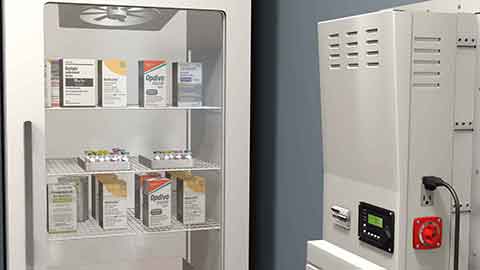Does Your Backup Solution Provide Uninterrupted Power for As Long As You Need It?
When a power outage strikes, every second counts—especially in environments like pharmacies, healthcare facilities, or clinics where sensitive equipment and medications must be kept at specific temperatures. Most organizations know the importance of having some form of backup power in place. But a question that’s often overlooked until it’s too late is: Does your backup solution actually provide uninterrupted power for as long as you need it?
If you're not sure, you’re not alone. Let’s explore why runtime matters, how to assess your current setup, and what to look for in a truly reliable emergency power system.
The Hidden Risks of Limited Runtime
Many facilities assume that any backup system—be it a generator or a UPS—will keep them covered through an outage. Unfortunately, that assumption can lead to costly losses.
Backup systems with limited runtime may only keep critical equipment powered for a, well, limited amount of time, which may be fine for short outages, but useless in a prolonged one. And as recent extreme weather events, grid overloads, and infrastructure failures have shown, multi-hour or even multi-day outages are increasingly common.
If your power solution fails before utility service is restored, you could face:
- Spoiled medications and vaccines
- Lost revenue and inventory
- Regulatory non-compliance
- Risk to patient safety and trust
The takeaway? Uninterrupted power is not just about starting up quickly—it’s about staying on long enough.
What "Uninterrupted" Really Means
The term "uninterrupted" gets thrown around a lot—but it’s worth defining. A truly uninterrupted power system doesn’t just react to outages. It should:
- Automatically switch over the moment power is lost
- Supply clean, stable electricity with no flickers or surges
- Run for as long as your operations require
- Recharge efficiently once power returns
In medical and pharmaceutical environments, even milliseconds of downtime can trigger equipment resets or cause cold storage to be compromised. That’s why true uninterrupted power supply (UPS) systems are so vital.
Key Factors to Consider When Evaluating Runtime
If you’re unsure whether your current backup power solution is sufficient, here are four essential questions to ask:
1. What’s the actual runtime under load?
Manufacturers often advertise maximum runtimes based on ideal conditions. Look at how long your system will last with all your necessary equipment running at once.
2. What equipment is protected?
Do you know exactly what appliances, freezers, or systems are covered? Is your pharmacy refrigerator included? What about your POS system or critical servers? Each covered equipment has its own power demand and your emergency power battery backup should be properly sized to handle the load.
3. How scalable is your solution?
Can your current setup be easily expanded if your power needs grow? Flexible systems can be customized to meet new regulatory requirements or changing facility needs. Medi-Products solutions are custom-built to order and are designed to be scalable.
4. Does it meet compliance standards?
Some states and provinces, like Nova Scotia in Canada, now require pharmacies to maintain safe storage temperatures for vaccines for at least 24 hours without human intervention during an outage. Other regions may soon follow. If your system can’t meet that benchmark, it may not just be inadequate—it could put you out of compliance.
Battery Backup vs. Gas Generators: Know the Difference
Generators have long been the go-to solution for backup power, but they come with limitations:
- Start-up delay (even a few seconds can disrupt sensitive equipment)
- Noise and fumes
- Fuel storage and maintenance requirements
- Often not permitted in certain zoning areas
By contrast, battery backup systems offer:
- Instant, silent power transfer
- No fuel or exhaust
- Modular runtime—can be sized for 24, 48, or even 96+ hours
- Maintenance-free operation
For many medical and retail settings, battery solutions are cleaner, safer, and more reliable over time. And depending on the location, they may be the only possible solution.
Case in Point: Pharmacy Power Compliance
Let’s say you’re running a pharmacy with two medical-grade refrigerators. Your local regulatory body requires 24 hours of uninterrupted power in case of an outage. If your current UPS can only support those units for 6 hours, you’re facing an 18-hour compliance gap. That could mean:
- Manually moving medications (risk of spoilage)
- Using ice packs (inconsistent temps, risk of spoilage)
- Emergency delivery from suppliers (if available, and can be expensive)
Or—you could install a properly sized battery backup system designed for your exact load, so you're covered automatically and confidently.
Don't Wait for the Next Outage
Power outages aren’t rare anymore. Whether caused by weather, accidents, or aging infrastructure, they are a real and growing threat to operational continuity—especially for facilities that store temperature-sensitive products or serve vulnerable populations.
Ask yourself:
- Does your backup system cover everything you need?
- Will it run long enough to get you through a real emergency?
If you’re not sure—or if your answer is no—it might be time to upgrade to a battery backup power solution that gives you true peace of mind.
Need help evaluating your current setup?
Contact Medi-Products today for a free, no-obligation consultation. We'll design a solution that keeps your facility running—no matter how long the outage lasts. Call us at 1-800-765-3237 or fill out the form below.


